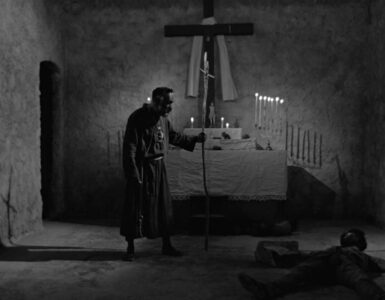Following on the heels of his beloved film, Tony Manero, director Pablo Larrain has become one of foreign films most talked about names. A man seemingly hell bent on steeping his viewers in the mental space of his main characters, be it the lead on Manero or the morgue clerk that the director sets as his focus in his new film, Post Mortem. Recently brought to Blu-ray thanks to the men and women over at Kino, Mortem is both one of Larrain’s most interesting works to date, while also being one of his most polarizing and cumbersome.
Set against the backdrop of Chile’s political landscape in 1973, when the country was truly on the edge, a military coup fully in toe, Post Mortem is a far more intimate feature than that setting would have one imagine, solely following a man who becomes entirely infatuated with a local dance who lives next door. A darkly comedic look at the true brutality that the nation it finds a home in would face during this time of political and social insanity, Mortem may very well be an engagingly dark meditation on a time and a place steep in tragedy, but it’s also a slow and nearly impenetrably cumbersome feature film that feels roughly three times its 90 minute runtime.
As mentioned at the start of the piece, Larrain is front and center here. Never knowing a desolate and perfectly shot frame he didn’t like, the film feels cold and distant, with muted cinematography and performances that try to keep the viewer at arm’s length the entire span of the film. Very much inspired by the films of directors like Michael Haneke, Mortem feels directly inspired by that filmmakers canon, but without holding the aforementioned Funny Games helmer’s sense for Bergman-esque introspection. Simply leaving the film lying on screen, Larrain doesn’t carry with Mortem the same level of artistic and intellectual intrigue that he did with his brilliant Manero, but instead opts for a film that is afraid to make any true emotional connection to its audience, or to engage it on an intellectual level either.
Performance wise, the film is quite superb. Alfredo Castro returns from Manero to star here as Mario, a soft spoken and introverted lead, playing as straight faced a lead as we’ve seen on screen in years. Giving absolutely no insight physically to his emotions or thoughts, Castro’s ability to craft a performance as darkly comedic and dry as the film’s inherent sense of humor only adds to the macabre comedy at this film’s core. Antonia Zegers adds a lot here as well, as the beautiful dancer who catches the voyeuristic eye of our lead. Giving the film its only palpable sense of cinematic energy or life, her performance is a true breath of fresh air.
Overall, while the film itself may be a relatively tough slog for many, those looking to engage the film with the utmost intellectual energy will get out of it what it sets out to be, a meditation on the political angst that nearly tore a country apart, and the same energy that is hindering many military-driven nations today. However, without any form of visual momentum, Post Mortem ultimately becomes a dry, poorly paced mess of a film, that now finally on home video in a nearly bare bones Blu-ray release, is as tough a sell as any.







![Bergman Island (The Criterion Collection) [Blu-ray]](https://criterioncast.com/wp-content/uploads/2022/11/bergman-island-the-criterion-collection-blu-ray-400x496.jpg)
![This Is Not a Burial, It’s a Resurrection (The Criterion Collection) [Blu-ray]](https://criterioncast.com/wp-content/uploads/2022/11/this-is-not-a-burial-its-a-resurrection-the-criterion-collection-blu-ray-400x496.jpg)
![Lars von Trier's Europe Trilogy (The Criterion Collection) [The Element of Crime/Epidemic/Europa] [Blu-ray]](https://criterioncast.com/wp-content/uploads/2022/11/lars-von-triers-europe-trilogy-the-criterion-collection-the-element-of-400x496.jpg)
![Imitation of Life (The Criterion Collection) [Blu-ray]](https://criterioncast.com/wp-content/uploads/2022/11/imitation-of-life-the-criterion-collection-blu-ray-400x496.jpg)
![The Adventures of Baron Munchausen (The Criterion Collection) [4K UHD]](https://criterioncast.com/wp-content/uploads/2022/11/the-adventures-of-baron-munchausen-the-criterion-collection-4k-uhd-400x496.jpg)
![Cooley High [Criterion Collection] [Blu-ray] [1975]](https://criterioncast.com/wp-content/uploads/2022/11/cooley-high-criterion-collection-blu-ray-1975-400x496.jpg)